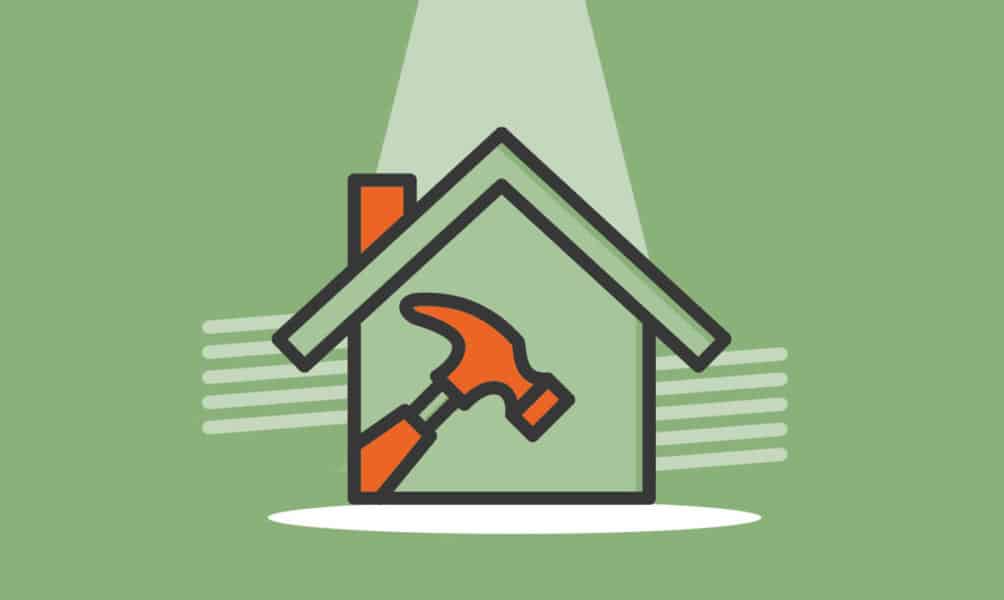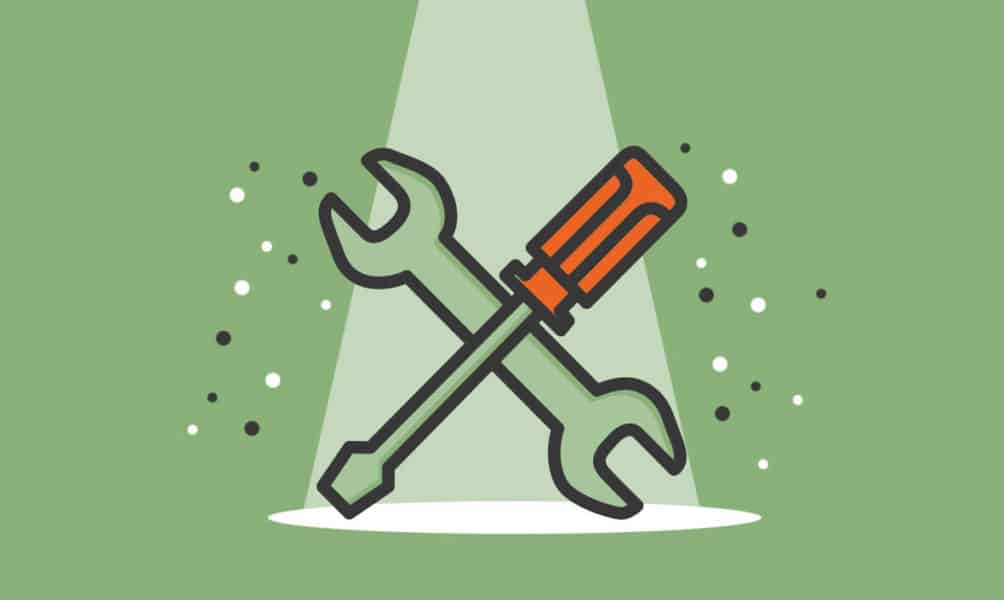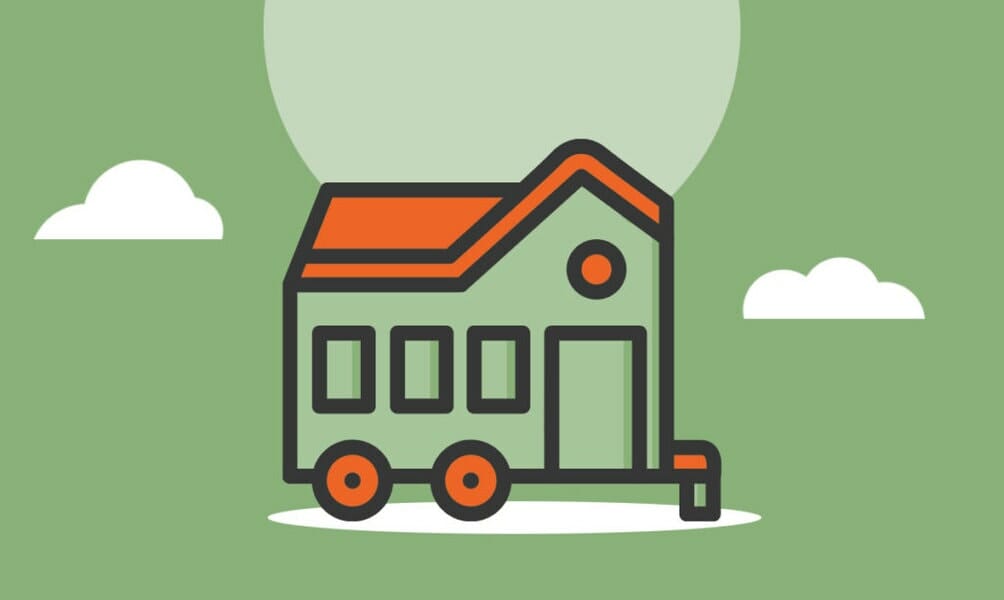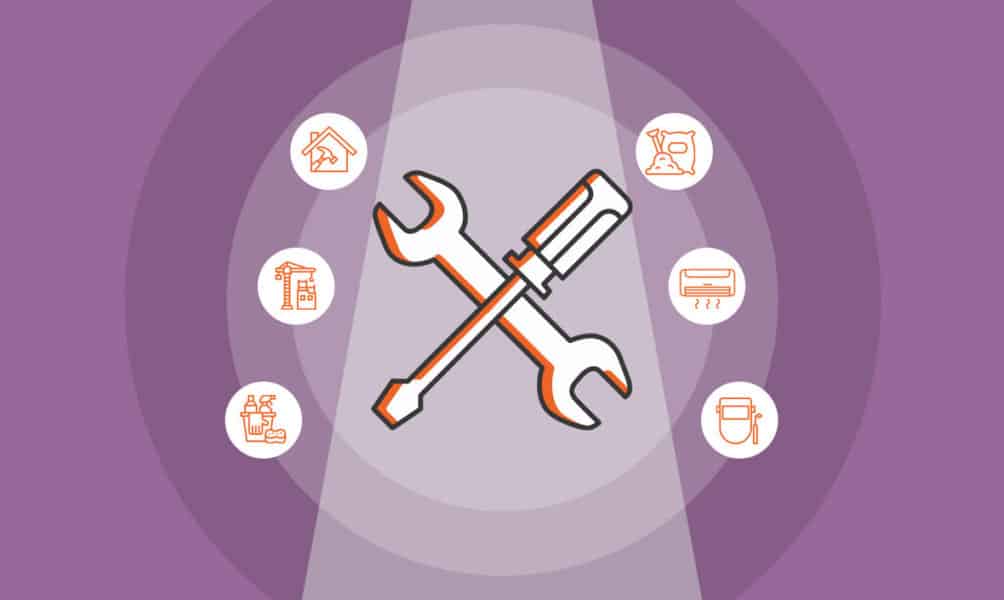The US handyman industry is worth a stunning $4 billion and growing, with demand for all variety of domestic services on the rise as the number ofho ...
24 Profitable Construction Business Ideas
Written by: David Lepeska
David has been writing and learning about business, finance and globalization for a quarter-century, starting with a small New York consulting firm in the 1990s.
Published on July 13, 2022

As the US economy regains strength in the wake of the pandemic, the construction industry is anticipating strong growth with plenty of opportunities, thanks in part to the government’s massive infrastructure bill. The industry is not limited to carpentry and actual construction — it also involves maintenance, renovations, repair and more.
Construction-related businesses include interior design, plumbing, house painting, woodworking, landscaping and beyond. Check out our list of profitable construction business ideas and begin your entrepreneurial journey!
1. Lawn Care

Are you a green thumb with an entrepreneurial spirit? If so, a lawn care business might be the perfect venture for you. It’s not construction, but it is definitely construction-adjacent.
Starting a lawn care business requires minimal initial investment but demands consistency and quality of service. Focus on reliable equipment and understanding various lawn types and their needs. Building relationships with clients through excellent customer service can lead to referrals and repeat business. Stay updated with eco-friendly practices to appeal to environmentally conscious customers.
Avoid overbooking and underdelivering by managing your schedule effectively.
2. Landscaping

Much like lawn care, if you love working on your yard and spending time outdoors, you might consider starting your own landscaping business.
To succeed in the landscaping business, creativity and attention to detail are crucial. Gain knowledge in design principles and horticulture to offer varied services. Use social media to showcase your projects and attract a wider audience. Develop partnerships with local nurseries for better material pricing.
Common pitfalls include underestimating project timelines and costs, so thorough planning and clear client communication are essential.
3. Concrete Supply

All that new US infrastructure is going to need a lot of concrete! Concrete production and delivery is a $63 billion revenue industry in the US. You can find it in streets, sidewalks, driveways, patios, buildings, barriers and much more. The future of concrete offers affordable, sustainable, and fast construction.
When launching a concrete supply company, understand local construction demands and establish reliable sources for your materials. Offer a range of products, including eco-friendly options, to differentiate your business in the market. Maintaining strong relationships with contractors and builders will ensure steady contracts.
Invest in quality control measures to avoid the pitfall of inconsistent product quality, which can harm your reputation.
4. Interior Design

Who doesn’t want their home to be as welcoming and comfortable as possible? Especially in this pandemic era, it’s no surprise that the US $26.1 billion interior design industry is seeing strong and steady growth. Now is a great time to start your own interior design business and help people feel more at ease in their own home. It doesn’t require much investment and you can run your business from home, when you’re not off visiting clients, that is.
An interior design business thrives on uniqueness and a keen eye for aesthetics. Stay current with trends while developing your signature style. Networking with contractors and suppliers can enhance your resource pool and help manage costs. Use project management tools to keep track of deadlines and budgets, avoiding common failures like project mismanagement. Excellent interpersonal skills can turn first-time clients into lifelong patrons.
5. Home Remodelling

You love your home, but sometimes you think it might need a bit of an upgrade, right? Countless homeowners across the United States feel the same way, which is why the US remodeling industry is was valued at $517 million in 2023 and is expected to grow in the following years. What’s even better for the entrepreneur is that the industry has expanded by more than 50% in the past decade, and is looking toward continued growth in the years ahead.
Home remodeling is lucrative but competitive. Focus on quality workmanship and customer service to build a strong reputation. Offer transparent cost estimates and realistic timelines to gain trust. Specialize in either historic restorations or modern renovations to target specific markets.
Avoid common mistakes like underestimating costs or timelines by regularly updating skills and using efficient project management software.
6. Painting Business

Painting may not be the most exciting line of work, but it can be quite lucrative, and demand is nearly constant due to all the ongoing construction. With a relatively small investment you could launch your painting business from your home, take on residential and commercial jobs, interior as well as exterior, and make good money while adding a burst of color to your community.
Use high-quality paints and supplies to distinguish your service. Effective marketing, especially in local communities, can drive business growth. Educate yourself on various painting techniques and safety protocols to avoid common hazards. Keeping appointments and being reliable are key to retaining customers and getting referrals.
7. Floor Installation

The wood flooring market in North America, which includes the US, was estimated to be worth $7.3 billion in 2022 while ceramic tiles market size was estimated at $4.2 billion in 2023. Both are expected to grow steadily through 2030, with ceramic tiles growing at a faster rate of more than 7%.
Among the popular flooring materials in the US are hardwood and engineered wood, ceramic tiles, and vinyl tiles.
In the floor installation industry, precision and knowledge of various materials are keys to success. Stay updated with the latest flooring technologies and eco-friendly options. Offering customization options can also set you apart from competitors. Build good relationships with suppliers to ensure the best pricing and material availability.
Common pitfalls include improper installation and not adhering to timelines, which can be mitigated by continuous training and effective project management.
8. Tile Retailing & Installation

Tiles are used in many applications, from flooring and walls to countertops and backsplashes. Ceramic tile consumption in the US was 264.5 million m2 in 2023.
For a tile retailing and installation business, having a diverse range of products and a knowledgeable staff is essential. Provide demonstrations and workshops to attract customers and showcase your expertise. Invest in understanding the latest installation techniques and trends in tile design. Developing strong supplier relationships will help manage costs and offer competitive pricing.
Avoid the pitfall of poor customer service by ensuring timely and professional installations.
9. Handyman Business

If you’re good with your hands and enjoy fixing things, starting a handyman business could be the perfect fit. For one thing, you’ll be doing what you love and taking care of people’s problems. For another, the US handyman industry has been growing steadily for years, and by 2026 the broader home services market is expected to double! So there’s clearly a real opportunity out there.
A handyman business excels through versatility and reliability. Offer a broad range of services, and invest in quality tools to handle various jobs efficiently. Marketing through word-of-mouth and local advertisements can build a strong local presence. Keep detailed records of all projects and client feedback to continuously improve your service offerings.
Avoid common mistakes like overextending your service capabilities or poor time management.
10. Electrical Business

Nearly 85,000 openings for electricians are projected in the US each year through 2030, the Bureau of Labor Statistics says. If you’re an electrician, now is a great time to start your own electrical business.
Starting an electrical business involves strict adherence to safety and industry regulations. Ensure all staff are certified and trained in the latest electrical standards. Focus on building a reputation for reliability and quality workmanship. Networking with local construction firms and real estate agents can provide steady work.
Common failures include not keeping up with code updates and safety standards, which can be avoided through ongoing education and compliance checks.
11. Welding Business

Welding is one of those skills we rarely think about, but is always in demand. The US welding market is expected to grow more than 40% by 2028. So if you have some skills or are a fast learner, now is a great time to start your own welding business and start building up a reputation.
In the welding industry, precision and safety are paramount. Invest in high-quality equipment and continuous training to maintain high standards. Offering specialized services can help capture niche markets. Build relationships with local industries and construction companies to secure contracts.
A common pitfall is neglecting equipment maintenance, leading to downtime and safety hazards, which can be avoided with regular checks.
12. Solar Business

Are you thinking of starting a solar business? If so, you’re in good company. Thanks to government incentives and greater concern about the environment, the solar business is growing rapidly, driven by environmental concerns and energy cost savings. The cost of panels has declined more than 60% in the past decade. To top it off, there’s probably never been a better time to go into business for yourself.
Stay informed about the latest solar technologies and government incentives to provide knowledgeable advice to customers. Building partnerships with homebuilders and commercial contractors can expand your customer base. Educate your team and clients on the benefits and maintenance of solar installations to ensure satisfaction and referrals.
Avoiding overpromising results can prevent customer dissatisfaction and boost your credibility.
13. Excavation Business

A booming construction industry is expected to drive sharp growth in US excavation services. Excavation contractors prepare the land for construction by digging trenches and foundations as well as drilling shafts. The excavation contractors industry is estimated at $118.7 billion in 2023 and still growing. Demand is projected to come from the private residential and nonresidential construction sector.
If you’re hoping to set up an excavation business, you will need a huge upfront investment or a loan to acquire the necessary heavy equipment like bulldozers, backhoes, front-end loaders, dump trucks and others. You also need to know the licensing, permits and zoning requirements.
Building strong relationships with construction companies and real estate developers can provide regular business opportunities. Safety training for all employees is essential to avoid accidents. It’s important to avoid underbidding on projects, which can lead to financial losses.
14. House Painting

Are you thinking of starting your own business? If so, house painting may be a good option for you. The US house painting and decorating contractors industry has steadily grown over the last five years.
For a house painting business, focus on delivering impeccable quality and customer service. Knowledge of different paint types and their appropriate applications is crucial. Effective marketing strategies, like showcasing before-and-after photos of your work, can attract more clients. Always adhere to timelines and budget agreements to build trust and encourage referrals.
Common pitfalls include neglecting thorough surface preparation, leading to poor job quality.
15. Carpentry

About 79,500 openings for carpenters are projected each year, on average, over the decade. Construction and renovation of homes, residential buildings, factories and other nonresidential structures will fuel demand for carpentry skills. Most of the job openings will arise from the need to replace workers who switch careers or retire.
A successful carpentry business requires precision craftsmanship and a good understanding of different wood types and their uses. Offering bespoke furniture or custom solutions can set you apart from competitors. Networking with local suppliers can help reduce material costs and increase profitability. Continuous skill development is important to keep up with industry trends and improve efficiency.
Avoid the common mistake of overlooking detailed project planning, which can lead to delays and customer dissatisfaction.
16. Roof Maintenance and Restoration

We rarely think about our roofs unless they need fixing, but the reality is that roofing is among the most crucial services a business can provide. Without a strong roof, what’s the point of an office or home? This helps explain why US roofing is worth $27.4 billion and expected to expand more than half by 2030. That’s some serious growth, and you could grab your share by starting a roofing business and providing a vital service to people in need.
In roof maintenance and restoration, reliability and timely service are key to building a solid reputation. Specializing in specific types of roofing materials can differentiate your business in a crowded market. Regular training on new materials and repair techniques is essential. Ensure comprehensive insurance coverage to build client trust and protect your business.
Common failures include underestimating the scope of repairs, resulting in cost overruns and unhappy customers.
17. Woodworking

Are you good with wood? If so, this is a great time to get into the woodworking industry, which has seen steady growth in recent years and is expected to be worth nearly $6.8 billion globally by 2030. These days, people everywhere are interested in hand-crafted, artisanal goods, and that includes wooden rocking chairs and wooden toys.
You could start your own woodworking business from home for little investment and ride this wave of appreciation for sturdy, traditional products to serious success. Even if the trend slows down, high-quality furniture and other wooden items are always in strong demand.
A woodworking business thrives on creativity and attention to detail. Maintaining high standards in your work and using quality materials can help establish a loyal customer base. Offering customization options and unique designs can attract a wide range of clients. Marketing your products through online platforms and local craft fairs can increase visibility.
It’s crucial to avoid undervaluing your work, which can lead to unsustainable pricing.
18. Tiny House Business

Tiny houses are cozy, cute, and increasingly popular. Imagine having everything you need within a 400-square-foot space. The tiny homes concept has been around since the 70s, but it’s only recently taken off as people opt to downsize, declutter and live simply. The global tiny homes market is predicted to grow by 2031. The forecast includes both mobile and stationary tiny homes.
Starting your own tiny house business can be a great way to achieve financial independence, but you need to decide first how to go about it. Will you rent or build tiny homes, or both? You’ll need to be aware of the laws and regulations relating to tiny homes. These vary from state to state, so be sure to check with local authorities.
You should also make sure that your business adheres to the standards for tiny homes. Whichever route you choose, this is an opportunity that you don’t want to miss out on.
19. Pallet Business

You probably don’t think of pallets very often, but those old-school wooden load carriers represent a sizable US market that’s expected to see strong growth through 2032. With more and more goods being shipped long distances, pallets are in great demand.
It’s not as difficult as you may think. First you’ll need to find an affordable, reliable source for wood and produce a few dozen pallets. Then you’ll start reaching out to manufacturers and logistics firms to offer your pallets for their goods shipments. You may want to offer a discount to get your foot in the door, but once you’ve signed that first contract you’ll be on your way to building a pallet empire. Just be sure to stay in compliance with all relevant trade and shipping regulations.
20. Cleaning Business

All that construction and renovation definitely leaves a mess, which is why a cleaning business is a great idea right now. The commercial cleaning industry contributes over $100 billion towards the U.S. economy each year. It has seen steady growth in recent years, so the opportunity is there for the taking.
A cleaning business can be highly successful with meticulous attention to detail and exceptional customer service. Offering flexible scheduling and a variety of services, from residential to commercial cleaning, can broaden your market. Using eco-friendly cleaning products can attract a segment of environmentally aware clients. Effective employee training and retention strategies are vital.
Common mistakes include inconsistent cleaning standards and poor communication with clients.
21. Sawmill Business

If you’re looking to start a sawmill business, you’re in luck. An increase in housing starts in the US as the pandemic winds down is expected to boost the sawmill industry. A sawmill business primarily supplies lumber, boards, beams, and other wood products. The US sawmills and wood production industry is worth $48.4 billion in 2023 and demand is expected to remain stable in the next five years.
When starting a sawmill business, it’s important to know what type of sawmill you want before you come up with a business plan. Will it cater to small-scale production or run large production lines? Will it be a standalone mill or will it integrate with other businesses? Sourcing is important. It’s to your advantage to find a regular supplier of logs that you can process into lumber.
Once you’ve set up your sawmill, it’s a good idea to choose the right platform for selling your products. If you understand your target market, your sawmill business could see serious profits.
22. Plumbing Business

We rarely think of our faucets, drains, and home water piping systems, but the reality is that plumbing is a massive $124 billion US industry that offers considerable opportunity. If you have some plumbing experience, or are just good with your hands and a quick study, you might want to consider starting your own plumbing company and getting in on the action.
If you’re not already a plumber, you could take online plumbing courses or work as an apprentice to an established plumber. Within a few months, you should be ready to pass the test and become a licensed plumber. Once you have obtained all the necessary tools and equipment, all that’s left is to build your website, list yourself with Google Business and start looking for clients in your area and on social media.
There’s always somebody out there with a clogged train, leaky sink or busted pipe, so you should start booking jobs in no time. From there you’ll just need to do good work, and you’ll be on the road to entrepreneurial success.
23. Drywall Business

Diving into the construction industry with a focus on drywall presents a strategic opportunity for budding entrepreneurs. Drywall, which forms the backbone of interior walls and ceilings in most modern structures, remains an indispensable material in both residential and commercial projects. Starting a drywall business involves not only mastering the craft of installation but also understanding the nuances of working with different types of drywall materials, from moisture-resistant boards in bathrooms to fire-resistant variants in commercial spaces.
While the technical side of the drywall business is paramount, success in the construction sector often hinges on operational efficiencies and strong business acumen. Those aiming to establish a thriving drywall business must navigate the regulatory landscape of building codes, zoning laws, and licensing requirements. Investment in durable tools and equipment, from drywall lifts to fastening systems, will be fundamental.
24. Upholstery Business

Venturing into the construction sector with an upholstery business offers a unique blend of craftsmanship and aesthetic appeal. Upholstery, the art of providing furniture with padding, springs, webbing, and fabric or leather covers, is an age-old craft that can breathe new life into worn-out or dated furniture. By mastering the intricacies of fabric selection, stitching, and furniture design, entrepreneurs can cater to a clientele looking to refurbish and personalize their interior spaces without completely replacing their existing furniture.
Starting an upholstery business requires a blend of technical skills and a keen eye for design. Entrepreneurs must invest in the right tools, ranging from staple guns to sewing machines, and continuously stay abreast of interior design trends to offer clients the most contemporary fabric choices and styles. Building relationships with furniture retailers, interior designers, and real estate agents can create a steady stream of referrals.
Comments
Leave a Reply
Subscribe to Our Newsletter
and gain insider access to cutting-edge business insights and trends.
Featured Resources

Discover 29 Profitable Handyman Business Ideas
Published on July 21, 2022
Read Now

How to Start a Small Business in 13 Steps
Published on January 15, 2022
Owning a successful business is one of the most rewarding things you can do with your life. It’s empowering and liberating, and allows you toprodu ...
Read Now

8 Blue Collar Business Ideas for Hands-On Entrepreneurs
Published on September 22, 2021
If you don’t mind getting your hands dirty, starting a blue-collar business is a tried and tested way to earn a good living. Thanks to increasedco ...
Read Now
super..